#archaeology for beginners
Explore tagged Tumblr posts
Text
Archaeology in the Renaissance Era; What is there to know?
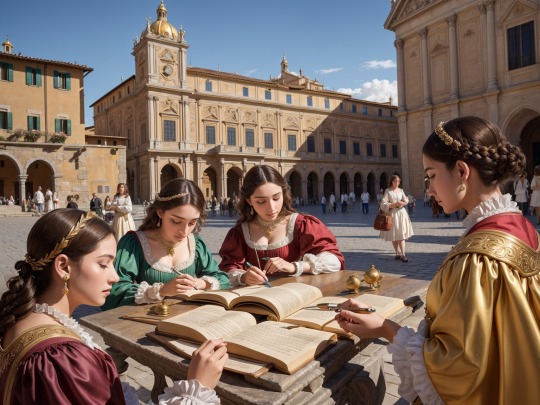
Obviously, you are all aware of the Renaissance or the European Renaissance. And, of course, you may know about archaeology. Or you may share an interest in both archaeology and the Renaissance. Have you heard about archaeology in the Renaissance?
As you may already know, archaeology as we know it today was not born overnight. So, it has a gradual emergence or development. Meaning it has a long history with phases, which I have introduced in my last two articles. And also, I have explained earlier that archaeology as we know it today was not there in the history of archaeology until the second half of the last century, but the earlier versions of archaeology, or the roots of archaeolog, were there thousands of years ago.
However, within those phases in the history of archaeology, the Renaissance era marked the second significant phase. So, why not look into the Renaissance era and its archaeology?
What is the Renaissance Era? A Brief Introduction to the Renaissance Era
The Renaissance was an interesting time in European history. It lasted from the 14th to the 18th centuries. At the end of the previous era, some political changes took place. Because of that, people at the end of the previous era rediscovered mediaeval classical philosophy, literature, and art. And that resulted in a cultural, aesthetical, political, and economic “rebirth”. Hence, it is called the Renaissance.
What happened with Archaeology in the Renaissance Era? An Introduction to Archaeology in Renaissance Era
The Renaissance of Sciences in Europe inspired the growth of both the passion for studying the past and the methods followed to study the past. During this age, collecting antiquities as art (aesthetic value) and old crafts (historical value) increased. Also, this triggered the desire to study the past to increase and the methods applied for investigating the past to improve. With colonisation, the same trend in Europe expanded to the Mediterranean and eastern worlds. As a result of these trends, remarkable discoveries relating to mankind’s past were made. And also, the Renaissance Era was the first period of time when archaeology first emerged as an organised field of study under that particular term. So, there were several important characteristics as well as several major episodes in this age relevant to archaeology.
How did archaeology develop in the Renaissance Era? Characteristics of the Renaissance Era in Relation to Archaeology
There were several significant characteristics in the Renaissance Era in relation to archaeology, such as antiquarianism, dilettantism, and the rise of the sciences.
Antiquarianism and Archaeology in the Renaissance Era
There was a competition for antiquities during the Renaissance Era. So, it was a looting, ransacking, despoiling, and exploitative act. Therefore, the term ‘antiquarianism‘ entered the vocabulary to describe this trend of taking possession of antiquities. As enthusiasm increased for the antiquities, digging the earth (excavating) came into practise to uncover them. Those excavations were simply unorganised and impatient diggings. However, excavations to recover antiquities expanded vastly. As mentioned earlier, excavating for physical remains inherited from the past is a primary data retrieval method in Archaeology. So, this early start of excavations prepared the path for archaeological excavation.
Furthermore, because these excavations were damaging to antiquities, the need for an organised method of excavation came up. The monuments discovered within colonies, especially in the East, were damaged during those unorganised diggings. So they wanted to minimise the damage they caused to the antiquities during the process of looting. As a result, excavators began to develop methods for ensuring the safety of antiquities. Clearly, one of the important steps in the development of archaeology as a discipline was the systematisation of antiquity excavation. So, it is clear that messy and harmful antiquarianism was what highlighted the need for a systematic and methodological excavation. Thus, antiquarianism created the path for the major practise of systematic and methodological excavation in archaeology. It is fascinating how something that negatively impacted antiquities paved the way for a long-lasting positive impact.
Dilettantism and Archaeology in the Renaissance Era
Antiquarianism became popular among Europe’s wealthy upper classes. They looted and took antiquities without sufficient knowledge of them, only seeing them as a form of art. This was known as dilettantism, and the people who engaged in it were known as dilettantes. They had no awareness or knowledge of antiquities, excavation techniques, or any of the basic concepts that archaeology concerns today. They have only known to be competitive and fulfil their desire by taking possession of antiquities and keeping them in their private cabinets. And they believed owning antiquities was a sign of wealth.
Antiquarian Societies and Archaeology in the Renaissance Era
As antiquarianism became increasingly popular in the 15th–17th centuries AD, they established antiquarian societies. They did not just stop at taking possession of antiquities and considering them art. Instead, they revived the passion for studying the past through antiquities. They also began to display these antiques in personal and state-owned cabinets. That appears to be how we got the concept of museums. What do you think?
As it turns out, antiquarianism and dilettantism coexisted. And both had a bad impact on antiquities and studying the past. Then, antiquarianism societies came and resurrected the study of the past again. And the dilettantes began to exhibit their collections in cabinets, and antiquarian societies also followed them. As you already know, if you have read earlier articles, studying the past through physical remains is what we do in archaeology. And what we do with those physical remains after the studies is exhibit them in museums. So it’s easy to see how dilettantism has paved the way for archaeology.
Anti-Dilettantism and Archaeology in the Renaissance Era
However, antiquarianism and dilettantism took antiquities away from their original lands. As a result, antiquities that Europeans did not own were in their cabinets as display pieces. Therefore, later on, new ideas and methods appeared against dilettantism, demanding antiquities be displayed in their native places. And this resistance rose from within and outside of the European community. In archaeology, when we conserve something or exhibit something in a museum, we consider the authenticity of the piece. That is why we make every effort to display physical findings on-site. You may have seen or heard that there are site museums in historical places all around the world to practise this. Then, when preserving an antiquity, we aim to keep it as close to its original shape as possible in every element. It’s now obvious where we got that from. As said before, how fascinating!
Key Events That Occurred in the Renaissance Era in Relation to Archaeology
There were several key events that took place during the Renaissance Era that significantly influenced the development of Archaeology. Some of those historical events were accidental, which may surprise you. And some of these incidents appeared more like good research than we assumed.
The discovery of Herculaneum and Pompeii
In 1738, Roque Joaquin de Alcubierre, a war engineer who served in the Spanish army, made a remarkable discovery. He excavated the Ancient Roman city of Herculaneum’ and discovered a theatre and a variety of wall paintings. Then, in 1748, he excavated Pompeii, a nearby Roman city. And it was one of the turning points in the history of archaeology—the development or emergence of archaeology. Until then, people had limited engagement with antiquities, just collecting them and keeping them in cabinets for display. But that quickly changed with the most wonderful discovery at Pompeii.
The excavation revealed that Vesuvius had erupted suddenly and killed the entire city. So, it revealed something tragic but marvellous—something we humans have never seen before. The people and animals who lived in that city had died in their natural postures of daily life. So, the excavation of Pompeii revealed how people in a city lived and engaged in daily life tasks hundreds of years ago. It clearly showed the world that excavations can recover not only the antiquities but also the dead people who owned them. And it also showed us how we can uncover the connection between those antiquities and the people via excavation. It established the fact that we can bring the history of mankind before our eyes through excavation. Therefore, using antiquities to study the past instead of antiquarianism became strongly popular in the community after the amazing discovery at Pompeii.
Thomas Jefferson’s Mound Excavation in Virginia
In 1784, the president of the USA, Thomas Jefferson, contributed as no one had before. He conducted an excavation in the Shenandoah Valley and in one of the 13 mounds in the Blue Ridge Mountains in the State of Virginia. During this excavation, he made several important findings. Jefferson and the team found human bones (skeletal remains) belonging to adult, child, and infant age groups. And they estimated the mound to be a burial mound for thousands of people. And also, they identified the deposits of the skeletons as secondary burials. So, this excavation was indeed a turning point in the history of archaeology. We consider this to be the first scientific archaeological excavation in the USA for many reasons. Those reasons are the nature of the elements of this excavation, such as the purpose, findings, and process of study.
The purpose of the excavation was not to find and collect antiquities but to study 13 assumedly manmade mounds. And also, the material remains discovered from the excavation were not the antiquities of popular tradition at the time. Instead, they discovered human skeletal remains. Those pieces of evidence were categorised and interpreted as human skeletons belonging to Red Indians. And they interpreted the mound as a burial mound and the skeletons being buried in the mound as secondary burials. Also, the complete report of the excavation was published in 1787.
So, there were some important characteristics in this whole excavation process that are elements of modern-day scientific research. There was a research purpose for this excavation. There was a data analysis part and an interpreting part. And a publishing part at the end. So, scientific archaeological research was first put into practise in Jefferson’s excavation, marking another important turning point in the emergence of archaeology.
The Rise of Research Work in the Late Renaissance Era in Relation to Archaeology
Meanwhile, it appears that by the 18th century AD, a wide range of ideas, hypotheses, and theories about the past had been proposed. The history of mankind, ancient civilizations, and the time before the ancient civilizations came into the discussion with ideas. There was an inclination to examine those new theories. And there was an inclination to study the history of mankind using antiquities rather than finding the history of antiquities.
In 1734, Nicholas Mahudel defined three uses of stone, bronze, and iron in a timeline. So, the new opinions that were introduced about the past were introduced as interpretations of the antiquities that were already found. And also, taking those opinions as theories, discovering antiquities based on them, and testing those opinions based on those findings took place in the field of interest. Hence, it is clear that the 15th–18th century era was the founding age of refining practises (methods) and developing a theoretical basis that are essential for scientific research. The Renaissance Era laid the foundation for the next phase of the history of archaeology when archaeology first emerged as a discipline.
Conclusion
Accordingly, The Renaissance Era paved the path for archaeology to become a scientific study by the end of the 18th century AD. In the following phase of the history of archaeology, it really turned out to be a well-established scientific discipline. So, as you may see, it was indeed a Renaissance for Archaeology too.
originally posted at: kamalsjournal.com
#archaeoblr#archaeology#archaeologist#archaeology for all#archaeology student#origin of archaeology#history of archaeology#the renaissance#the renaissance world tour#archaeology in the renaissance#chanakakamal#kamalsjournal#empowering curiosity#inspiring understanding#archaeology for beginners#antiquarianism#dilettantism#antiquarian#dilettante
0 notes
Text
Excavating Adventure: A Comprehensive Guide to Treasure Hunting Strategies
"Excavating Adventure" is your ultimate guide to the thrilling world of treasure hunting. This comprehensive book explores various strategies, from traditional methods to cutting-edge technologies, ensuring treasure seekers of all levels have the tools they need to uncover hidden riches.
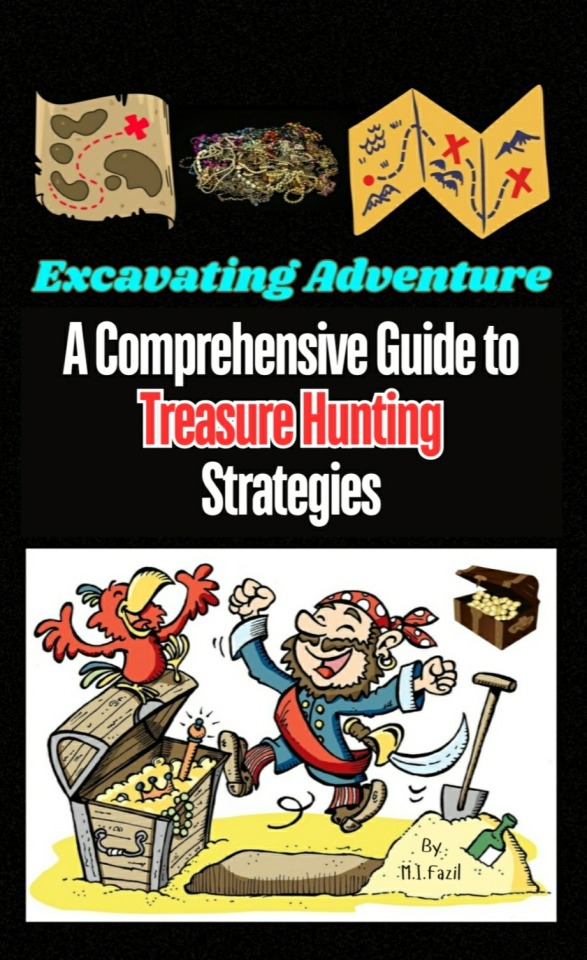
Dive into the rich history and techniques of treasure hunting, starting with decoding ancient clues and using modern metal detectors. Explore the depths with underwater exploration and magnet fishing, or embark on a digital quest through geocaching. Discover the mysteries beneath urban landscapes through urban exploring and geophysical surveys, while advanced methods like satellite imaging and sonar technology offer new perspectives on uncovering the past.
In addition to practical techniques, "Excavating Adventure" delves into the world of archaeological excavation, meteorite hunting, and fossil discovery, bridging the gap between science and adventure. The book also addresses crucial legal considerations, ensuring that treasure hunters remain within the bounds of the law as they pursue their passion.
Concluding with a captivating history of the world's most expensive treasures and ancient methods of discovery, this guide provides a wealth of knowledge for anyone eager to embark on their own treasure-hunting journey. Whether you're a seasoned adventurer or a curious beginner, *Excavating Adventure* equips you with the skills and knowledge to turn your quest for treasure into a successful and thrilling adventure.
#books#Treasure Hunting#Metal Detecting Techniques#Underwater Treasure Hunting#Geocaching Tips#Magnet Fishing Methods#Urban Exploration Strategies#Archaeological Excavation#Treasure Hunting Technologies#Fossil Hunting Guide#Meteorite Discovery Techniques#History of Treasure Hunting#Legal Considerations for Treasure Hunters#Treasure Hunting for Beginners#Advanced Treasure Hunting#Satellite Imaging in Archaeology#treasure hunting strategies#metal detecting#metal detecting guide#archaeological excavation#archaeological research#historical artifacts#treasure hunting tips#gold prospecting#artifact collecting#treasure hunting community
1 note
·
View note
Text
Italian Audio/Books/Videos Masterlist
Now that I’m at the upper A2/lower B1 level for Italian, I figured I’d compile a quick list of where I’ve found the best stuff to read and listen to.
E-Books and Audiobooks
Kobo Rakuten Italia — where I buy my ebooks. You can read them online, in the app, or download them and [redacted] to export them elsewhere. Has a monthly unlimited subscription that functions like a combo Kindle/Audible subscription.
Storytel — monthly subscription for unlimited access to audiobooks.
YouTube
Learn Italian With Lucrezia — truly the savior of anyone learning Italian. My favorite videos are her Q&As, vlogs, and “n basic phrases you need to know.” I don’t get much out of her grammar explainer videos but that’s because of who I am as a person.
NovaLectio — commentary style mini documentaries. I export them to LingQ to read before watching and it helps me parse what’s going on. Also, they upload some videos dubbed in English so you can watch both.
Vogue Italia — celebrity interviews and fashion content. About 50/50 Italian and English but obviously high production value.
ArtandtheCities — criminally underrated channel imo. 10-15 minute art history/industry videos by an art historian. Super interesting, she’s easy to understand, and has captions.
Chef Max Mariola — utter chaos but fun. A Roman chef cooking various dishes, sometimes with a guest. Gives very “your uncle is hosting Thanksgiving and forgot until yesterday” vibes but in the best way.
TV/Movies/Documentaries
RaiPlay (free!) — Italian version of PBS. Lots of documentaries and some kind of goofy soap operas/narrative shows. You can also watch live TV.
Podcasts and Radio
RaiPlay Sound — basically NPR. Also free! You can find podcasts, live radio stations, audiobooks, and even audio descriptions of movies and TV shows.
Articles
Formula 1 Italia — Formula 1 news. I’m a big Ferrari fan but they cover a lot of news/current events (as long as they can connect it to a driver). The writing is short and to the point so it’s easy to parse for beginners. And honestly the drama is better than a lot of TV shows.
Stile Arte — long, more complex articles about art and archaeology. Cannot recommend it enough if you have an interest in any of those things. There are some straightforward history articles at the B1/B2 level, and also some more creative essays that push C1.
Corriere della Sera — daily news site. I started reading the news only in Italian to keep me from doom scrolling because America is terrifying. This is just the site I have ended up using a lot. Mostly because it’s easy to navigate and they have a ton of content.
#langblr#ref#reference#langblr resources#italian langblr#italian language#italiano#italian reference#language master list#Italian master list#learning italian#mine
233 notes
·
View notes
Text
Ancestral Veneration and Why it’s Important
This is going to be a post about a topic that people seem to forget or deem unimportant even fearful about with either good reasons or just never thought about it. I just wanted to mention YOU DO NOT HAVE TO WORK WITH ANCESTORS IN YOUR PRACTICE this blog is mostly for those who are interested in it and not sure what ancestral veneration is.
I’m a pagan and a witch that practices Ancestral veneration in my practice, not around it but it’s definitely a big part of why I practice certain paths. I’ll go in beginner tips, what to expect and the myths, the offerings and the recommendations. But let me go a bit into the importance of Ancestral Veneration and worship in human history since it’s still prevalent today.
Historical importance of Ancestral Worship
Ancestral worship and veneration has been at least one of the oldest religions that humans have ever believed in. Archaeological evidence shows the early humans taking care of their dead and burying them for respect and dignity maybe even courtesy to the deceased. It became sacred to them, imagine back then without fully understanding about the world someone that you spoke and saw now gone, it’s a profound moment one’s life that they must believe that their spirit lives on and they themselves wanted a peaceful resting place. It’s a cycle, many cultures and religions believe that life is a cycle, death is never the “end” rather an end of a journey to a new part of one’s life.
To this day people honor their deceased loved ones, visiting their graves, offering them gifts at their resting places, speaking to them, having their picture on a table surrounded by their favorite flowers, etc. Honoring the dead and respecting the dead is a very revered part of human life and something that we all would like to expect when we’re gone from our living family. Spirits also related or not, the dead as well should be treated with outmost respect and dignity like our ancestors did.
Some cultures like the Romans believed that if the spirits especially ancestral spirits (Lares) weren’t appeased they become angry if worshipped improperly or their will have not be been fulfilled. In Ancient Greek tradition they would place a coin in the mouth for the deceased to make sure their spirits would go into the afterlife safely and less traumatic. Each culture and society had a different way of how the ancestors would live in the afterlife.
Even in the Christian Bible shows the significance of ancestors, there is a reason why genealogies are included in the Bible. How Jewish people revere Abraham as their founding father since he is the first Hebrew patriarch which is very important to them and their religion. How even Jesus is related to David on both sides. Even immediate family is important like Jesus’s mother Holy Mary. In Norse Paganism it’s said that the kings were descend from gods like the Swedish Royal family related to Freyr. In Shintoism it is said that the First Emperor of Japan is related to the Sun Goddess Amaterasu. Japan and other many East Asian countries have a strong relationship and traditions regrading Ancestors.
Why Ancestral Veneration?
Ancestral Veneration is generally taken outside of paganism and witchcraft a very sacred thing for families, they can heal, they can come together, grieve together, reminisce together especially if they knew that person in life. But also asking the deceased loved ones for guidance and protection, to help their family in life whom they love the most. Plus this can help especially if you are into past life regression, we reincarnated with our ancestors many times and they have been able to see us in their time and now. It can be really insightful to understand of who we were in those lives.
Whatever legacy they left behind that you admired from them is continued for generations to come as well as heirlooms, a mother passing down her sentimental items to daughters or their children alike it’s a remembrance of what they were known by as well.
“Cows die, family die, you will die the same way . I know only one thing that never dies: the reputation of the one who’s died.” Havamal, Stanza 77.
If you’re going into paganism or witchcraft or both that are related to your ancestry. Your ancestors are the best teachers and mentors especially if they also have been in these specific practices and traditions. If you want to learn Seidr for instance a magical practice rooted within Scandinavian traditions and you have said Scandinavian roots you can contact a ancestor that practiced it in life and willing to help and teach you. What’s unfortunate about ancestral veneration looking down upon for many centuries making people turn away and against the practice is that it’s said that spirits can become lost if they aren’t being honored or remembered that makes them fade and lost.
Five Myths about Ancestral Veneration and what to expect. This is not going to be sugarcoated, I’m being honest and this what I’ve experienced in my own practice and how many others have experienced as well. I would add on if I forgot anything but these are most common misconceptions I have heard. The red are the myths if you are wondering.
Myth #1: All ancestors on the other side have my best interest and support all what I’m doing This is a common misbelief, now there is ancestors that will support you no matter what and your actions. But if you’re a pagan and a witch there is going to be Christian ancestors who won’t support you at all. Their human spirits with still human functions and beliefs. Not to say you can’t communicate but set your intentions and boundaries before meeting them, some will tolerate and some will make their opinions and beliefs known possibly even try to convince you. I know it sounds like fear mongering but it’s to what you would expect. This doesn’t mean you cannot make contact or venerate them because of it. It’s a choice that is a two way street, even spirits in the other side have freewill just like we do.
Myth #2: All Ancestors are well in spirit No, not exactly, when humans on earth do horrible things or experience horrible things it will take affect in the spirit world no matter what. Keep in mind time works very differently in the other world that it will take centuries for those who are healing to fully recover and those to actually realize their problems, messed up life on earth if they choose to recognize it. Again as I said just humans in the physical world human spirits also have free will and choices.
Myth #3: Only Human spirits are ancestors Nope commonly yes when we think of Ancestors we think of human beings that lived either with us or before us. But this isn’t the case, pets for instance that became our beloved family members and part of our inner circle are our ancestors. My cat that recently passed I had him since I was nine years old, I always thought and treated him like family because of that he merged into my family circle. Also animals can symbols of family, like a bear, an owl, an elephant, etc. that they can be represented as your ancestors as a whole.
Myth #4 : Ancestors are limited to just blood family Also a misconception, close friends and even adopted family members are considered to be close family. Some people won’t have blood relatives in life and find their found family which is just as valid and meaningful like a blood family is. This also goes to if you’re a person that likes to write you might venerate your favorite author, if you like to draw or paint you can venerate an artist that you admired a lot. Your family might have patron saints, deities, or local heroes and spirits that have been part of your family for generations. That’s why it’s nice to know where your family originated from what country, village, city, etc.
Myth #5: No Ancestors of mine did anything wrong Everyone’s ancestors did something horribly wrong in their lifetime, some were messed up people. But there are good ones that aren’t like that anymore, if you want to venerate them that’s up to you and your practice. I personally don’t do it because especially if they did something wrong and have no remorse for it I ain’t venerating none of them.
There is no reason to be afraid.
I know I seemed to be fear mongering in the previous part that’s because I don’t want to sugarcoated of which is most likely to be expected.
The Bottom line when contacting (if you want to have contact with them) and venerating your ancestors is that their no different from a human person in this physical realm. They will have personalities, likes, dislikes, opinions, beliefs like any other human being BUT from my experience a lot of my ancestors are very wise, humorous, kind, and non-judgmental. My advice if you really want to contact someone who is going to be supportive and helpful in your paganism and witchcraft, ask specifically for that person I usually ask for ancient ancestors pre Christian wise but there many folk witches and pagan ancestors that are more modern and recent that can most definitely help you! Speak to them like any other human interaction would be as if you’re talking to a living friend, family member or complete stranger you’re meeting for the first time.
How to Communicate with your ancestors
I have mention “contacting” your ancestors you can speak with them it’s not impossible.
1. Meditation and dream work: Most common and effective way to really get them to communicate you and send signs is through dreams. Meditation for a clear and close connection with them.
2. Tarot: Very common and just as effective, my most recommended first step when communicating with your ancestors. Using a tarot deck can help with putting your foot through the door. There is a great book which will recommend at the of the blog that does ancestral and tarot together.
3. Pendulum and a spirit board: This is more in depth but it has been very effective for me and many others to really connect and communicate with my ancestors. It’s good to state your intentions and boundaries before doing any of said above, but this is where you really need to set it. Before starting grab the pendulum over the board don’t let it swing and say, “I ask of the good and supporting ancestors that have me in good intent and support of my path and practice, I would like to meet you”. Of course you get specific like “I would like to meet an ancient Roman ancestor” that’s just an example of how it would go safely and respectfully.
4. Just talking to them. Yep sounds easy enough, you would just get something that represents ancestors or even a specific ancestor. For instance your grandmother’s rosary and just talk to them or pray to them. It’s a very simple and comforting way to bond with your family.
Offerings
This is going to be a “it depends on the ancestors” but there has been a universal notion of what ancestors do really like. From items, food, drink, etc.
Rosaries for catholic ancestors or the cross for Christian ancestors generally speaking
Pagan symbols for your pagan ancestors
Statues of ancestral gods or saints or other important entities
Sweets: Cookies and cakes are very popular
Alcohol: my Germanic ancestors love it when I offer beer, mead, ale. But also wine and other alcoholic beverages for others.
Regular libations like water, coffee, tea. juice, etc. good substitute if you cannot use alcohol.
Their meals from their home country, my Italian ancestors, recent and ancient love it when I make them pasta.
Incense some cultures call it the food for spirits
Heirlooms
Family photographs
Candles
Coins
Book of the dead, if you meet an ancestor you can record them down into a book that is solely for your family and to be passed down on and on. It’s a memorial service to them that someone knows their name and who they were.
Specific traditions that your ancestors came from for instance libations of wine for your Greek ancestors.
Good ancestral veneration books that personally helped me a lot and I know a lot of others to get started.
Ancestral Tarot by Nancy Hendrickson she helps how to contact and connect with your ancestors and ancestry using tarot
Ancestral Grimoire by Nancy Hendrickson like Ancestral Tarot she goes how to connect with your ancestors but this time how to really work with them. One of the exercises is to work with an ancestor for a month and a different for the next one.
Honoring your Ancestors by Mallorie Vaudoise she gives good information on different ways to connect with your ancestors, the different types of ancestors, she does have a Southern European and Catholic folk magic take to it which is fine but it’s not the sole focus of it but she does put good information in the book to help someone get started. 
Badass Ancestors by Patti Wigington also good beginners guide to ancestral veneration and how to connect through meditations and develop relationships with them even how to deal with problematic ancestors. She goes into how to research your genealogy and useful tips!
#paganism#hellenic polytheism#witchcraft#hellenic community#norse paganism#celtic paganism#kemetism#ancestral worship#ancestry#ancestral veneration#paganblr
143 notes
·
View notes
Text
Tarot Card Legacy Challenge
Generation 1: The Fool
Pack Focus: High School Years, For Rent
Goals:
Active, Outgoing, Adventurous
Master the Fitness skill to Level 10 by participating in school sports
Complete the "Outdoor Enthusiast" or “Body Builder” aspiration, going on outdoor adventures with friends and exploring hidden spots in the neighborhood.
Collect all types of fish and insects in the neighborhood as a beginner angler and bug collector.
Achieve 10 charisma skill by making friends and socializing at school events and parties.
Gather collectibles like feathers and crystals by exploring secret areas around the neighborhood and completing after-school activities.
Romance: The Fool finds romance during high school, developing a crush on their lab partner or a fellow athlete. They navigate their first love through shy glances, secret notes, and stolen moments in between classes.
Generation 2: The Empress
Pack Focus: Dream Home Decorator, Growing Together
Goals:
Green Fiend, Family-oriented, Nature Lover
Master the Gardening skill to Level 10 by tending to the school garden and helping out,and personal garden
Complete the "Freelance Botanist" or “Super Parent” aspiration, selling home-grown produce and flowers
Achieve Level 10 in the Parenting skill by babysitting younger siblings or volunteering
Collect all types of flowers and produce to create beautiful floral arrangements and healthy meals for the family.
Participate in neighborhood gardening competitions, showcasing the family's garden and winning prizes for their beautiful blooms.
Romance: The Empress meets their significant other at a community gardening event or through mutual friends. Their romance blossoms over shared interests in nature and sustainability, with romantic picnics in the park and stargazing under the moonlight.
Generation 3: The Emperor
Pack Focus: For Rent, Home Chef Hustle Stuff
Goals:
Handy, Ambitious,Outdoorsy
Master the Handiness skill to Level 10 by fixing up the family's rented home and helping neighbors with household repairs.
Complete the "Outdoor Enthusiast" or” Master Chef” aspiration, going on camping trips with friends and mastering the art of outdoor cooking.
Achieve Level 10 in the Logic skill
Collect all types of fossils and crystals during outdoor adventures and neighborhood exploration.
Establish a successful food business, selling handcrafted meals made with locally sourced ingredients.
Romance: The Emperor finds love at a neighborhood block party or while volunteering at the local soup kitchen. Their relationship flourishes over shared meals and cozy nights in, with romantic dinners cooked together in their food truck.
Generation 4: The High Priestess
Pack Focus: Crystal Creations Stuff, Realm of Magic
Goals:
Bookworm, Paranoid, Creative
Master the Spellcasting skill and unlock all spells by studying ancient tomes and practicing magic rituals.
Complete the "Spellcraft & Sorcery" or “ Archaeology Scholar” aspiration, delving deeper into the mysteries of magic and mastering potion-making.
Achieve Level 10 in the Logic skill by experimenting with magical elements and researching arcane phenomena.
Collect all magical artifacts and tomes by exploring hidden caves and participating in magical duels.
Explore all hidden areas in Glimmerbrook and Forgotten Hollow to uncover ancient secrets and mystical creatures.
Romance: The High Priestess meets their soulmate at a magical gathering or during a séance. Their bond deepens through shared experiences in the magical realm, with romantic moonlit rituals and enchanted picnics in enchanted forests.
Generation 5: The Lovers
Pack Focus: My Wedding Stories, Get Together
Goals:
Romantic, Outgoing, Charismatic
Master the Acting skill to Level 10 by participating in school theater productions and joining drama clubs.
Complete the "World-Famous Celebrity" or “ Soulmate” aspiration, climbing the ranks of fame and hosting extravagant parties.
Achieve Level 10 in the Charisma skill by networking at social events and building a large circle of friends.
Collect all celebrity memorabilia and awards by attending exclusive parties
Host extravagant parties and events in luxury penthouses, showcasing the glamorous lifestyle of the rich and famous.
Romance: The Lovers meet at a high-profile gala or VIP event, instantly drawn to each other's charisma and charm. Their love story unfolds amidst the glittering lights of the city, with romantic rooftop dinners and spontaneous adventures in the nightlife scene.
Generation 6: The Chariot
Pack Focus: Horse Ranch, Werewolves
Animal Lover, Adventurous, Independent
Goals:
Master the Robotics skill and build advanced robots to assist with farm chores and household tasks.
Complete the "Renaissance Sim" or “Championship Rider” aspiration, excelling in multiple fields of study and expertise, including horse riding and animal training.
Achieve Level 10 in the Handiness skill by repairing farm equipment and maintaining the family's homestead.
Collect all elements and crystals to craft potent potions and futuristic inventions for the family ranch.
Travel to all vacation worlds and explore cultural landmarks and local traditions, incorporating new techniques into the family's farming practices.
Romance: The Chariot finds love in the countryside, meeting their partner at a local rodeo or equestrian event. Their romance flourishes over horseback rides through scenic trails and cozy nights by the fireplace.
Generation 7: Strength
Pack Focus: Cats & Dogs, Seasons
Animal Lover, Family-oriented, Athletic
Goals:
Master the Veterinary skill to Level 10 by opening a veterinary clinic and caring for pets and wildlife in the community.
Complete the "Animal Enthusiast" or “Friend of the Animals” aspiration, fostering strong bonds with animals and participating in pet competitions.
Achieve Level 10 in the Wellness skill by practicing yoga and promoting physical and emotional well-being for Sims and animals alike.
Collect all types of feathers and notes in a bottle, to create unique crafts and decorations for the family's pet-friendly home.
Participate in seasonal festivals and competitions
Romance: Strength meets their partner at a local animal shelter or while walking their pets in the park. Their love grows through shared adventures with their furry companions, with romantic picnics and sunset walks along the beach.
Generation 8: The Hermit
Pack Focus: For Rent, StrangerVille
Paranoid, Bookworm, Loner
Goals:
Master the Herbalism skill to Level 10 by foraging for rare plants and brewing potent potions to unravel the mysteries of StrangerVille.
Complete the "Paranormal Investigator" or “Strangerville Mystery” aspiration, investigating strange occurrences and uncovering hidden truths in the mysterious town.
Achieve Level 10 in the Logic skill by analyzing evidence and conducting experiments to solve the town's supernatural mysteries.
Collect all types of artifacts and relics by exploring secret labs and hidden caves, documenting strange occurrences and encounters.
Investigate secret conspiracies and alien encounters, uncovering the truth behind the town's strange phenomena.
Romance: The Hermit finds love amidst the mysteries of StrangerVille, meeting their partner while investigating paranormal activity or sharing theories at the local diner. Their romance deepens as they work together to uncover the town's secrets, with late-night stakeouts and passionate debates over conspiracy theories.
Generation 9: The Wheel of Fortune
Pack Focus: My Wedding Stories, For Rent
Party Animal, Outgoing, Ambitious
Goals:
Master the DJ Mixing skill and become a renowned DJ by hosting epic parties and events in the community.
Complete the "Party Animal" or “Fabulously Wealthy” aspiration, mastering the art of socializing and bringing people together through music and entertainment.
Achieve Level 10 in the Cooking skill by experimenting with new recipes and hosting seasonal feasts and gatherings.
Collect all types of rare and exotic fruits and vegetables to create signature dishes and cocktails for their events.
Participate in seasonal festivals and competitions, winning prizes and earning recognition for their contributions to community spirit and celebration.
Romance: The Wheel of Fortune finds love on the dance floor, meeting their partner at a lively nightclub or music festival. Their romance ignites through shared passion for music and nightlife, with spontaneous dance-offs and intimate moments under the stars.
Generation 10: The Star
Pack Focus: Get Famous, Dream Home Decorator
Goals:
Charismatic,Ambitious, High- Maintenance
Rise to stardom as a celebrity in the entertainment industry, pursuing careers in acting, music, or comedy, and gaining fame and recognition.
Develop culinary skills to create stunning dishes and desserts, showcasing talents through cooking shows or hosting celebrity dinner parties.
Utilize interior design expertise to decorate lavish homes and venues for celebrity clients, earning acclaim for their exquisite taste.
Master the photography skill to capture glamorous moments on red carpets, at exclusive events, and during intimate gatherings.
Utilize gaming expertise to engage with fans through live streams and gaming events, building a dedicated online following fascinated by their celebrity lifestyle.
Romance: The Star finds love amidst the glitz and glamour of celebrity life, meeting their partner at industry events, through mutual connections, or even on the set of a blockbuster film. Their romance plays out in the public eye, with paparazzi capturing their every move and fans speculating about their relationship. Despite the challenges of fame, their love remains strong, and they ultimately tie the knot in a star-studded ceremony, attended by fellow celebrities and broadcasted to millions of viewers worldwide.
Complete World-Famous Celebrity or Master Actor/Master Actress aspiration
-Slay, I will be fixing this challenge little by little.
#TS4TarotLegacy
#ts4 challenge#sims 4 legacy#ts4 legacy#the sims 4#the sims legacy#sims legacy challenge#simblr#ts4 gameplay#ts4cc#sims 4 gameplay#sims 4 challenge#sims legacy#TS4TarotLegacy
251 notes
·
View notes
Note
How do we know which views on paganism are wrong instead of just different from our own? Can you detail what you think is wrong?
As a reconstructionist, my view is that pagan practice should be informed by a careful examination of historical sources, philosophy, and archaeological evidence.
Obviously, we can't make our practices look exactly the same as those of historic practitioners, but I personally think that doing things that are completely opposite to historic practices and our knowledge are wrong.
A lot of neo-Wiccan and new age influences that encourage source blindness and take a bunch of practices out of their historic and theological context, and push them into a vaguely pagan framework are also bad in my opinion. There is a huge culture in modern paganism of just seeing some random ritual online and just doing it without doing any research about its origins or any contemplation of its metaphysical causes and effects.
Besides that, treating the gods and divine with disrespect, which is also very common nowadays. I also consider atheopaganism inherently wrong, as it is an appropriation of pagan terms and concepts for ulterior motives in most cases.
I also think that forms of paganism inspired by nationalism or fascism don't belong in pagan spaces, as they, just like a lot of secular pagan views, appropriate pagan gods and ideas to their pre conceived notions. For those people, the gods aren't divine entities, they are just symbols of a nation, on the same level as a flag or an anthem. Also, historic pagan morals do not approve of murder or genocide.
The last major thing I see and consider wrong is pagan spirituality heavily informed by religious trauma. A lot of ex Christians treat paganism as a middle finger to their former religion and not a belief system in its own right. They also tend to deny aspects of paganism, which are usually held in common with Christianity, such as prayer, worship, piety, ideas of virtue, etc. They pretend like these things never existed, and from this viewpoint, we get completely inaccurate statements such as "pagans don't bow before their gods" and similar stuff.
And to conclude, obviously, if a beginner or newbie is holding these views, I don't think they should be crucified or something. I held a lot of those as a beginner, and that's how I came to realise that they were wrong. I say these things from pov of a roman reconstructionist, so they might obviously not apply to every single kind of paganism, but they are trends I noticed in the broader community that I personally consider detrimental to paganism as a movement.
7 notes
·
View notes
Note
sorry if im mixing u up w someone else but i think i remember u posting rlly good ds/elden ring stuff? i am #very bad at games n dont have the skill or dexterity to rlly play the games but i rlly love urs n the other lore posts i see on my dash esp about ds,, do u have any recommendations on where i can read more about the lore n analysis of it n stuff or watch stuff or anything? i imagine theres a lot of Really Bad Stuff out there n dont have enough context for the games to rlly filter it out! tysm <3
ogh this iz an interesting one. first ov all i think watching playthroughz and reading item descriptionz can get you Pretty far, i only actually played ER after SotE but i got a pretty basic grasp of the fundamentalz from playthroughz n item descriptionz. for ER id especially recommend looking up anything you're curious abou in Elden Ring Text Explorer. i mean ill say for sure therez not any analysis i like, 100% endorse, every lore theorist i watch haz some interesting ideaz and some stuff i disagree with; i view lore analystz az more ov a mine for interesting interpretationz than any kinda objective tellerz ov truth. with this in mind im gonna loosely sort a non exhaustive list ov th lore analystz i personally engage with into "largely sober analyses which are fairly grounded in textual evidence" and "wackier analyses which make larger leapz that should be taken with a heavy grain ov salt but make entertaining videoz with interesting ideaz." i like a bit ov both in my diet. in no particular order Grounded Analystz - Lokey and Last Protagonist: probably the most popular lore analystz who look at th original japanese script. last protagonistz Fear The Old Lore seriez on DS/BB/ER iz required viewing especially imo, it coverz a lot ov translation foiblez tht trip up a lot ov english only analystz so it servez az a pretty good primer for Dubious Lore Ideaz tht get a lotta traction - SmoughTown makez summary style breakdownz ov lore & iz good abt presenting hiz speculation az speculation, pretty good beginner lore content id say - AesirAesthetics makez long video essayz abt th Themez ov fromsofttwarez gamez & i like em - T-L-G-T-W made really really good videoz pre-DLC but tragically nothing since - Zullie the Witch and BonfireVN cover technical aspects of the gamez and character modelz, frequently containing lore insightz - TeenSith ive talked to a lot on discord & haz good takez. shez only got the one article post-DLC but itz a banger Wacky Analystz Scum Mage Infa: probably the platonic ideal ov this. i barely agree with anything in their videoz but itz entertaining enough i alwayz watch to see wht theyve dreamed up this time The Snack Covenant - podcast for discussing fromsoft lore, very not serious. they dont rlly like ER much tho so if ur in th market for elden ring lore prob look elsewhere x3 Pevigeild Sage: nice voice & pretty unique takez. Tarnished Archeologist: focusez in on a lot ov interesting archaeological referencez in fromsoft tht r otherwise oft underdiscussed. th stuff he extrapolatez from tht real world history in2 ER iz quite dubious but itz still worth wattching imo ANTI RECOMMENDATION i hate Firelink Conspiracy's smug shitass video essayz so bad itz unreal. in general anyone claiming to be presenting u with the Hidden Underlying Truth ov these gamez by peddling some jungian tripe about how itz all a metaphor for Exclusively Western esotercisim & philosophy iz blowing smoke up ur ass. itz just Jordan Peterson for souls lore analysis. i will never forget firelink conspiracy calling the normal irish name Ciaran a "westernized Oriental name" in support of the east in dark souls (aka fantasy japan) SECRETLY being izalith the entire time. pure western chauvinist horseshittery
2 notes
·
View notes
Note
Hey Reid, having a major sad about the fact that university swallowed me, chomped hard and then spit me out. Any thoughts on how to get into Arch without a degree? I know I should try to be positive and go with 'not yet' but it's hard. Ive tried looking for volunteering opportunities but cannot find anything that goes beyond 'beginner'.
Hi dirtling,
First, I hear that you are sad about university not working out. Higher education is unfortunately not designed in a way that supports many students. Your frustration with the system is valid.
I tried to think really carefully before answering this question because I didn't want to blindly perpetuate ivory tower supremacy. But the truth is that archaeology is a highly specialized field which requires highly specialized knowledge and qualifications, and the way you acquire those is... going to school. Right now, you're only finding beginner opportunities in archaeology because you are a beginner.
I want to be clear that this isn't anything against you. It's just that right now, you don't have the qualifications needed for a career in the field. And I get that that sucks. But just like you need a welding certification to be a welder, you need a degree to be an archaeologist.
By all means, volunteer. That's a great way to stay engaged and get experience for the future if you ever decide to go back to school. And if it was the formal classroom structure you were struggling with, I would highly recommend doing a field school! That's a hands on, learn by doing opportunity that will qualify you to work basic archaeology tech jobs. You don't have to be a traditional college student to enroll—many institutions have programs where you can enroll in just a class at a time as you go.
Here's a post I made about applying to a field school in case that sounds like something you might be interested in.
Best of luck, -Reid
#he speaks#archaeology advice#I know this isn't the answer you wanted. but if there was a way to be an archaeologist without a degree I wouldn't be in grad school right
53 notes
·
View notes
Text
first day back from break ready for the hell to come in the next two weeks left in the semester, heres some updates.
- i have two movies to watch today (3 hrs total) and assignments along w them
- all the projects i have due by the 13th:
• dinosaurs group project 6; extinction (2 page report)
• controversies in archaeology; still havent chosen if im writing about gender roles in Çatalhöyük or Paleolithic art (1500-2000 words)
• ethnomusicology fieldwork project about music & rituals, must observe/participate in a ritual involving music (3-5 pages)
• ethnomusicology oral report & literature comparison; choose 3 articles to compare in written discussion and use 1/3 to present an oral report to the class (i am actually very excited for this one)
^^^ im doing the oral report on the culture/history surrounding break dancing and the music used in battles, im attending the schools breaking club beginner class tomorrow to observe their discussion about the music & see what ill be learning when i join the class next semester
- preparing for the end of semester dance show case !!
#studyblr#study blog#langblr#langblog#anthropology#language learning#languageblr#anthro#dance#street dance#ethnomusicology#archaeology#dinosaurs#paleontology#cultural anthropology#biological anthropology
25 notes
·
View notes
Text
A calendar of events for all things ancient!
Howdy, y'all! I'm excited to announce that Saving Ancient Studies Alliance (SASA), a volunteer-driven organization dedicated to making the ancient world more accessible, has published a massive calendar of events related to the ancient world. I'm also very excited to announce that this project has been my baby for the better part of a year and I'm so proud to finally have it published.
This calendar includes conferences, lectures, classes, and field school/excavation opportunities, among other things. There are events included all the way until 2033, and it will be continuously updated by SASA's team of hardworking volunteers. Further, though this calendar definitely favors the ancient Mediterranean, there are opportunities associated with various ancient civilizations all over the world. This is an awesome resource for any scholar who is looking for an opportunity to expand or share their knowledge.
UPDATE: currently, due to a miscommunication with our web design team, the calendar is inaccessible to people who do not volunteer with the organization. we are working on it, and hope to have it up and running for the public very soon. I will update this post with the link when it is available.
In the near future, we hope to have a similar list specifically for scholarships, fellowships, and other monetary awards. So, keep your eye out for that!
SASA also has a ton of other great resources for scholars of the ancient world ranging from beginner to seasoned professional. We have links to hundreds of databases, resources, and professional organizations, bilingual (English-other language) lists of archaeological vocabulary for 8 languages, educational videos, twitch streams for ancient-world-related video games, and 50+ partner organizations for all things ancient!
#isaac.txt#archaeology#classical archaeology#art#academic accessibility#academia#resources#ancient studies#ancient history#medieval archaeology#maritime archaeology#classics
16 notes
·
View notes
Text
There is a Background Era of Archaeology?
Archaeology was not born overnight. Maybe the term 'archaeology' was born overnight, but what we refer to by that was not. It emerged gradually over hundreds of years. But not many of us know it. And that is why most of the time we miss out on the background era of archaeology. Confusing right?
Here is the thing: if you look into the definition of archaeology it says, "archaeology is the study of past human culture, behaviour, and cognition through material remains left from the past". Then, if you look into the origin of the definition, it's just in 1980s. Then, If we look into the origin of the term archaeology, we might find a year or probably a hundred-year time span. But that is not the origin of archaeology. Archaeology's history goes beyond the origin of the term archaeology. So, the history of archaeology consists of four phases. The first phase is the background era of archaeology. The second phase is the archaeology of the Renaissance era. The third and fourth phases are the 19th and 20th centuries' archaeology, respectively.
Well, before you ask, there is no clear line between these four phases, but only some unique characteristics. And sometimes, we talk about the 18th century as a separate phase of the history of archaeology. Since the Renaissance was the driving force behind most of the events and developments that occurred in the 1700s, I thought of talking about them along with the Renaissance itself. However, in this blog, let's dive into the background era of archaeology.
Introduction to the Background Era of Archaeology
The first age of the history of archaeology is the background era of archaeology. And that was the era when humans first examined their own past. There seemed to be two reasons for humans to be concerned about their past, such as:
curiosity about the past
curiosity about the monuments and material remains that they did not know who created
Curiosity about the past is a human trait. As an intelligent species, mankind wonders about its past. So did the people who lived in this background era of the history of archaeology.
Also, they had seen the monuments and other material remains that they did not create. That alone could have triggered curiosity about their past. However, they seemed curious about those monuments and other material remains they found.
Key Features of the Background Era of Archaeology
There are two key features of this era that we can easily determine.
Folklore relating to the past and material remains of the past
Elites who actively engaged in the search for the past and the material remains of the past
Driven by the curiosity of the material remains they found, the people in this era and their ancestors created legends, myths, and stories. That folklore culture was constructed around those physical remains and around the people they thought built them in the first place. This folklore culture has passed from generation to generation, growing bigger.
With the capability the elite held in this era to afford to engage in quests in search of the lost cities buried or hidden that were ascribed in the legends, they actively engaged. Unlike the general public, who were limited to the stories, they took a step forward to explore.
Both of these characteristics in this era show the interest people had in the past and their engagement with it. The idea of material remains left from the past holding the stories of the past was there.
Key Events in the Background Era of the History of Archaeology
The background era of archaeology was not only an era when people showed interest in the past or in the material remains that were left from the past. As mentioned above, the elites actively engage in satisfying themselves with their desire to reveal the past. Here are the most significant key events that happened during this era and are significant in the history of archaeology:
Paraoh's excavation of Spinx in the 2nd millennium BC
The first excavation in history is considered to have happened during the new kingdom era in Egypt (ca. 1660–1070 BCE), when the pharaoh excavated and reconstructed the sphinx, which was originally built during the old kingdom (ca. 2575–2134 BCE). Here, the need for ensuring the lifespan of material remains from the past can be seen. That showed an early form of preservation and conservation that is present in modern archaeology.
Nabonidus's Excavation and Interpretation in the 6th Century BC
Since there are no written records other than archaeological evidence of above event, the first ever recorded excavation is considered to have been done by Nabonidus, the last king of Babylon (555–539 BCE). He excavated and unearthed the stone foundation of a building dedicated to Naram-Sin, who was a royal in the Akkadian order. Nabonidus even dated the unearthed monument, though the dates were inaccurate by 1500 years.
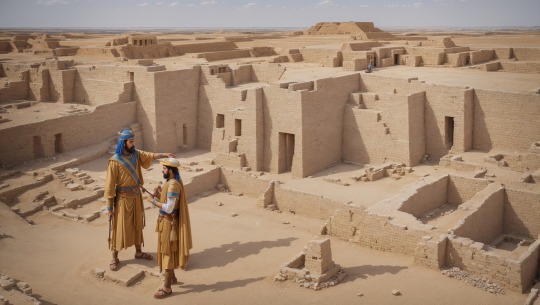
So, here, excavating material remnants that come from the past and giving interpretations based on the excavation results were evident. Those interpretations were simple conclusions they reached after searching. This was the first ever practical involvement done regarding the history of humankind and the monuments inherent in the past in the documented history. In other words, it was the first documented incident of researching first and then interpreting inherent material from the past.
Thicydides's Interpretations of Delos Island Burials in the 5th Century BC
In the Classical Greek era, a historian named Thucydides, who lived in Greece (460–400 BC), identified some monuments in the Delos islands as burials and presumed that those burials belonged to an ethnic population called ‘Carians’. This was the first incident in history in which a historian, a person who specialised in studying humanity’s past, studied the material remains and constructed a simple interpretation.
Romans' Involvement with Antiquities in the 1st Century BC to the 5th Century AD
Then, during the Roman Empire (31 BC–476 AD), Europeans introduced the term ‘antiquities to refer to the monuments and other material remains inherent in the past. Antiquity is a word that gives the meaning of ‘ancient’. And, most importantly, they not only recognised material remains as antiquities but also conserved and exhibited them.
Conclusion
As described, it is evident that mankind from ancient times to the 15th century AD was curious and passionate about their past and the monuments inherent in it. Apparently, the monuments inherent in the past have been appealing enough for people to study the past. Clearly, this led to the gradual emergence of practises and trends during the period. One significant practise introduced was identifying monuments and other material remains inherent in the past as antiquities. The trend of Constructing folk stories connecting the antiquities to the ancestors who lived in the past was a significant feature. Similarly, looking for antiquities in order to investigate them and their legends was a prominent feature of this era. Furthermore, unearthing, collecting, and then exhibiting antiquities was popular during this time period.
By the end of this era, common practises of searching for, unearthing, collecting, and displaying antiquities were more for aesthetic purposes than for historical research. However, even though a specific discipline did not develop, the basic concept for such a discipline was developed during this era. Hence, this era is termed ‘the conceptual age of studying the past’. Because the concept of studying the past was there. Therefore, this era is the first era of the history of Archaeology; the first era of the development of archaeology. The European Renaissance succeeded this era. The Renaissance era marked the second phase of the history of archaeology, taking the concept of studying the past to the next level.
Originally posted on: kamalsjournal.com
#archaeoblr#archaeologist#archaeology#archaeology for all#archaeology student#history of archaeology#origin of archaeology#background era of archaeology#archaeology for beginners#archaeology made simple#archaeology made easy#kamalsjournal#chanakakamal#sharing knowledge#empowering curiosity#inspiring understanding
0 notes
Text
hello history/archaeology people- do any of you happen to have any books/resources you would recommend to a total beginner to start learning about prehistory?
#please im rlly dumb when it comes to this sort of thing#but we've been covering a bit of the palaeolithic in archaeology club and its SO cool..... i know very little about it so far#but i would love to learn more !! if anyone has any recommendations i woudk be forever in your debt :]
6 notes
·
View notes
Text
Gen 3. Aurora #7 Childhood Awaits
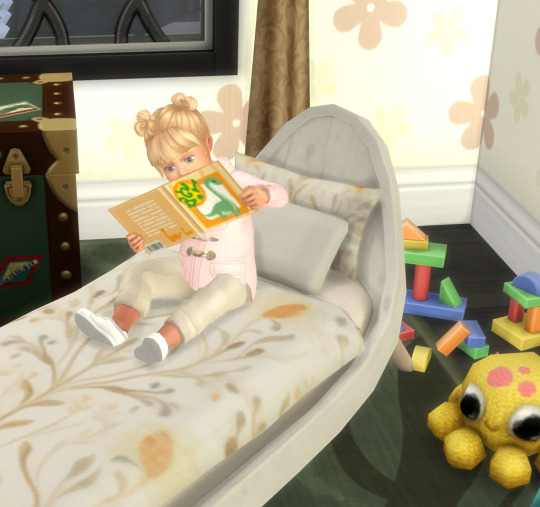
"Briar Rose, we need to get your thinking up..."

Simeon had finally gotten over his midlife crisis and decided to try a new job - in archaeology.
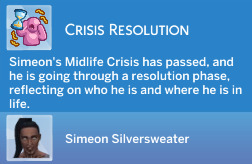

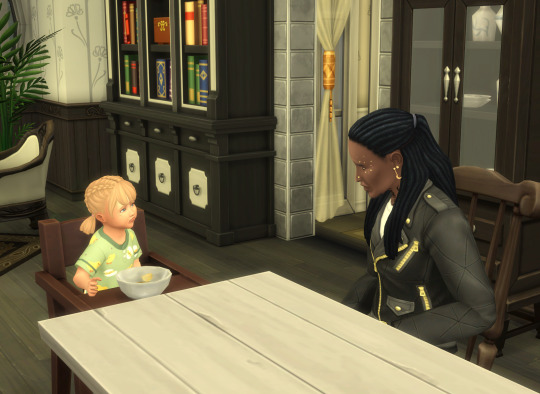
Feeling much more at peace, he spent more time with Briar Rose. But he fed her questionable meals (bowl of chips?).

Still, the two felt much more connected.

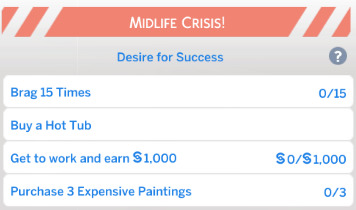
This worked out well for L, because she had deadlines to meet for her Freelance Writing job. She had gotten her full-blown midlife crisis and needed to make money... the household was living bill to bill by selling off their digging finds and crafting, and the meager paycheck from Simeon’s job.
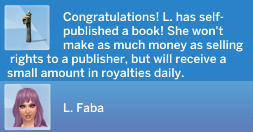
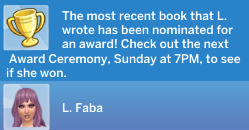
Beginner's luck...? This was literally her first book.
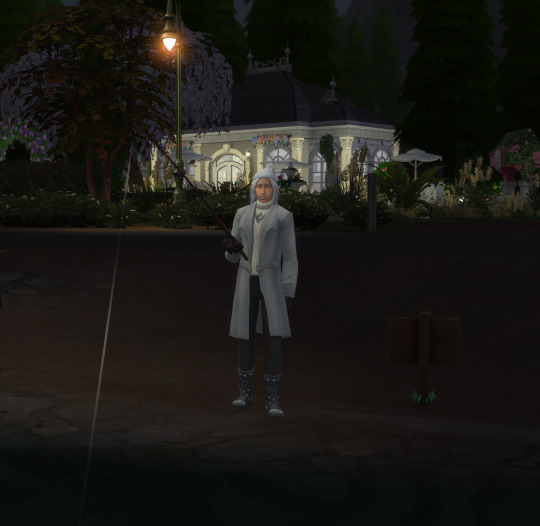
Morgyn was out late fishing for his midlife crisis.... and finally...
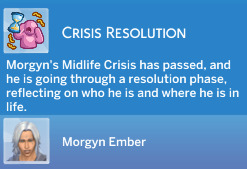
Just in time too... because he almost missed Briar Rose's birthday.
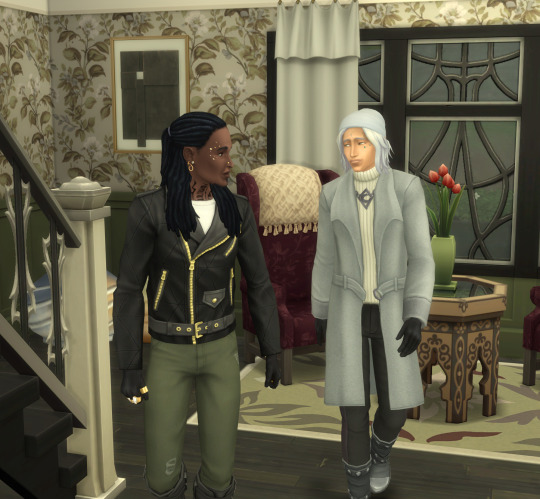
These two ex-Sages were finally able to get back on track... what a relief.
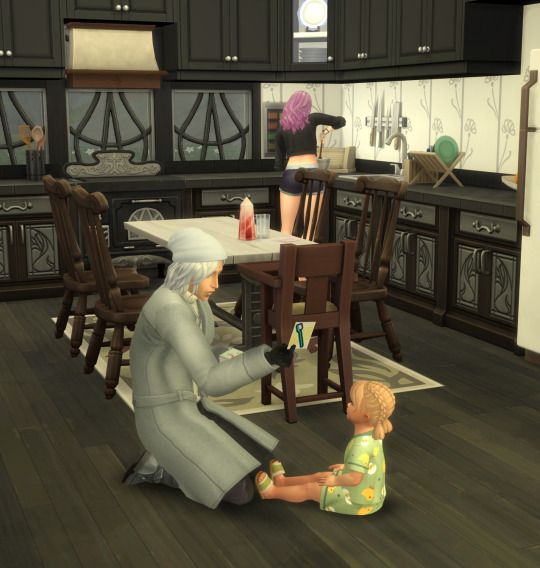
As Morgyn made up for lost time in the moments before Briar Rose aged up, L. baked a cake.

Time to celebrate! Happy Childhood Day, Briar Rose!
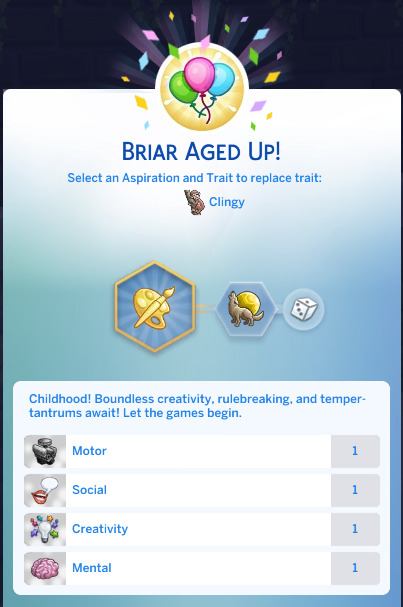
The first thing she did was drop out of school (well... there was no school option for her anyway, since she was hiding out in the forest. She didn’t even know school existed.).
She chose Artistic Prodigy to be her first childhood aspiration.
Yeah, the Sages didn't do so well on training up Briar Rose's toddler skills. She got level 3 for all the toddler skills, at least.

A newly minted grown child, she snuggled happily in her new bed. She felt just like the princesses she had read about in her toddler books.
@imfromsixam The Princess and the Vampire
Main Back Next
#giprincesschallenge#sims 4#sims 4 legacy#sims 4 gameplay#sims 4 story#disney princess challenge#disney princess legacy#gen 3 aurora#aurora#sleeping beauty#ts4#ts4 legacy#ts4 gameplay#the sims 4
3 notes
·
View notes
Text
☮ Greeting ☮
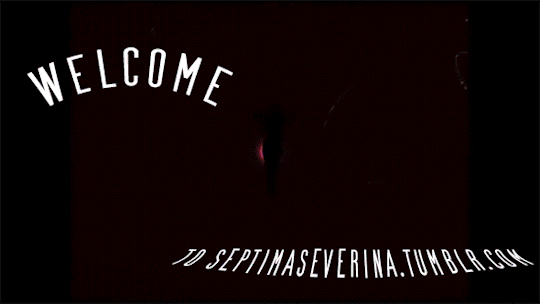
🌹 Sept 🌏 South East Asian woman ♀️ She/Her
💡 Trying to make gifs AKA beginner
सं Sanskrit student 📚 Linguistic and Arts enthusiastist.
🏛 Epicurean. Existentialism. Yogic. Ayuravedic. Stoicism (trying to).
🖥 Semi-public and personal blog. Established in 2013 (on hiatus late 2020-mid 2021). Random one. Half serious and half shitposts. Yet, I have other blogs too;
🌱 Resource and reference section -> @sept-resources
🌻 Fan fictions writing's blog -> @septimaseverinawannawrite
🌺 Fan fictions rec blog -> @septimaseverinaficrec
I reblog both academic, fandoms and shitpost stuffs - which I need, I obsessed, I love and I want.
And here is my permanent obsession lists 👇
⊱ Fandom ⊰
❧ Star Wars
Searching by Characters and series' names, also 'Star Wars reference'. For main films in general, I tagged as 'prequel trilogy' , 'original trilogy' and 'sequel trilogy'.
❧ Tolkien (Side Blog >>> click)
Books. Legendariam. Peter Jackson's films. Prime's Rings of Power Series.
❧ Assassin's Creed
Haven't played Origin, Odyssey, Valhalla and Mirage yet.
❧ Dishonored
❧ Game of Thrones (Side Blog >>> click)
HBO series; Game of Thrones+House of the Dragon. A Song of Ice and Fire. Fire & Blood.
❧ Men Diego Luna. Pedro Pascal. David Tennant. Dev Patel. Lee Pace and Etc. They are my husbands and loves of my life
❧ Bollywood
❧ Period Dramas
❧ Searching by films and series' name.
❧ Doctor Who
❧ Tele-Series
❧ Films
.·͙̩̩̥͙˚̩̥̩̥̩̩͙‧͙ .★⍣ ೋ⍣ ೋ⍣ ೋ⍣ ೋ⍣ ೋ⍣ ★.·͙̩̩̥͙˚̩̥̩̥̩̩͙‧͙ .
⊱ Academic Things ⊰
❧ Art
Fine Arts. Aesthetic. Art history. Fashion. Jewellery design. Gifmaking and ETC
❧ Archaeology
❧ History
❧ Architecture
❧ Linguistic
Etymology. Philology. Writing Systems. Psycholinguistic. Sociolinguistic. Orthography and ETC
❧ Sociology
Anthropology. Cultures. Folklores. Universal Lores.
❧ Botany
❧ Astronomy
❧ Astrology
.·͙̩̩̥͙˚̩̥̩̥̩̩͙‧͙ .★⍣ ೋ⍣ ೋ⍣ ೋ⍣ ೋ⍣ ೋ⍣ ★.·͙̩̩̥͙˚̩̥̩̥̩̩͙‧͙ .
✼ IMPORTANT ✼
Below 17. Homophobics. Misogynists. NAZIs. Fascists. KKKs. Racists. Scammers. Empty blogs. Spammers. P*rn blogs. "Sending me your n*de photos and videos". "I want a romantic/s*xual relationships with you". Fallacies. Haters.
YOU WILL BE BLOCKED.
Friendly, mutual and allied blogs - you're always welcome here.
.
Sincerely, Sept. 🌹🌻
2 notes
·
View notes
Text
Notes On Heathenism: Advice & Misconceptions
Today’s article will be much more casual. When I was first getting into Germanic paganism, I watched every single “advice for beginners” and “common misconceptions about paganism” YouTube video that I could find. I also scoured the internet for articles on this topic. I searched things such as “prayers to the gods” and “how to leave offerings for the gods.” This is something I’m sure many of us pagans have experienced, but looking back on what I’ve read and watched, I now disagree with a great deal of it. A lot of these articles and videos were created by neopagans. Now, many of you may be shocked to learn that I actually don’t hate neopagans. I am heavily reconstructionist, but I believe that people have the freedom to practice their faith in whatever way they want, and I honestly feel that a lot of reconstructionists have a superiority complex (don’t worry, I will elaborate on all of this in a separate article.) Despite this, I must admit that a lot of the poor advice and misinformation I’ve come across has been spread by neopagans. There is no issue with incorporating your own ideas, philosophy, practices, etc with pre-Christian religions, but it becomes an issue once you begin claiming fiction as fact. Anyhow, I’m writing this in hopes of providing actually useful advice from a restructionist perspective, as well as encourage others to be very cautious with what they read online.
1. Don’t Trust Anyone
This ties into the introduction of this article. Do not blindly trust scholars and academics, and certainly do not trust anyone claiming to be a pagan online. You shouldn’t even trust me. When I create these articles, my goal is to introduce different concepts that people can then research on their own. Please don’t rely on my articles or anyone else’s writings for all of your information. You need to read primary sources (well, as close as you can get to primary, considering the majority of literature on Germanic paganism has been written by Christians. When I refer to primary sources, I just mean works close to the pagan period) and interpret things for yourself. You can’t even fully trust the primary sources! A lot of them are subject to Christian distortions. Of course, if you are at all familiar with Christianity, you can somewhat sort out what has been Christianised and what hasn’t. Secondly, we have archaeological evidence that can be used to fill in some gaps and provide insight on pre-Christian society. Going back to what I said about not trusting scholars, they have the tendency to project rationalism onto everything, so to speak. They are often dogmatic, narrow minded, and too often try to insert some form of abrahamic thinking into paganism. It’s important to research things for yourself. Put down whatever contemporary work you just picked up from someone who self published on Amazon. I won’t completely reject these works, but in my opinion, they should be read AFTER you do your own research. After all, you are the most impressionable at the beginning of your journey.
2. Find What Works For You
There is not one way to worship the gods. Everyone’s practice and experience is going to be different, so you really need to take your time to experiment with different ways of worship and see what speaks to you. As a heavily reconstructionist practitioner, I’d like to let you know that a reconstructionist path is not for everyone, and that does not make your practice less valid (I hate using the word ‘valid’ and that type of language, but you get my point.) You should be prioritizing your relationship with the gods more than anything else. If you find that attempting to exactly recreate pre-Christian rites is too complicated or is preventing you from developing a connection with the divine and grow spiritually, then you should probably try something different. You should not feel confined when practicing your native faith. Paganism is the religion of nature; nature cannot be confined. It is fluid and uncontrolled. You are apart of nature and your faith centers it, so do not seek to control yourself and every aspect of your practice. Free yourself from the shackles of abrahamic thought and realize that change is necessary for spiritual growth. Letting go of some things is needed.
3. Don’t Get Discouraged
Early on, I made the mistake of attempting to meditate for an hour a day, leave an offering to every single god, and study some new concept everyday. This obviously leads to burn out and I became exhausted as well as disconnected to my faith. Although I was unsatisfied with what I was doing and found that my practice was unfulfilling, I was hesitant to change. You need to understand that any religious journey is not linear. You are going to have difficulties, there will be things you don’t understand, and you may need to endure some discomfort. However, it’s important to not let these challenges deter you. Paganism is the religion of strength, so learn from your experiences and appreciate the hardship. No goal has ever been achieved without struggle. The gods are not going to be angry with you for feeling confused or daunted, this is a Christian line of thought. We are humans, we are going to make mistakes even when it comes to our religious journeys; what is important is whether we allow these mistakes to define us and hinder us, or if we embrace them and learn.
4. Change Your Mindset
Stop searching for what offerings to leave to which gods and start getting creative. Searching things like this can be great inspiration, but do not follow them directly. Stop doing things because someone told you to. Get creative and start thinking for yourself. I think many pagans, especially those from a Christian upbringing, have a very black and white mindset. As in, “there is a right way to worship the gods and a wrong way, so I can only leave this type of offering and say this type of prayer because google told me to.” Again, paganism is not a dogmatic religion. There are no preachers, you don’t need to be told how to worship the gods. Take time to form your own experiences and do things your own way. Find what enhances your practice and what doesn’t, don’t just do something for the sake of doing it. When I first began worshipping the gods and other spirits, I felt incredibly silly. I would think things like “why am I sitting here talking to a rosebush and leaving this cool stone I found as an offering?” This is something you’ll likely relate to if you were raised Christian or in a non-religious household. You’re going to have to work hard to adopt a new mindset and forget your old way of doing things and any pre-conceived notions about religion. I spoke earlier about scholars projecting rationalism or abrahamic thinking onto everything, but I think we also do this too. Learn to open up your mind and approach all things with curiosity.
5. You Are Not Equal To The Gods
I’ve encountered many self proclaimed pagans online who have a very odd and transactional relationship with the gods. The gods are not obliged to you. Stop expecting for every single offering or other act of worship to be immediately reciprocated. Sure, you might get something in return, but the gods do not answer to you. I honestly have no idea where this type of attitude came from, but it is incorrect and disrespectful.
6. Venerate The Land Spirits
I think many have the tendency to neglect the land spirits. People often discuss leaving offerings for the gods, but I think we need to place more of an emphasis on leaving offerings to the land spirits and house spirits. In my opinion, we have more of a direct interaction with these spirits than the gods. The gods are obviously important, but the land and house spirits are more likely to have a direct impact on our daily lives. Plus, we know that land and house spirits were extremely important to our ancestors because it is a belief that has persisted even into modern times. These spirits are crucial to many different folk beliefs for good reason.
5 notes
·
View notes
Note
what kinda stuff do u sew!
Hi! so im still a beginner when it comes to hands on application, but i mainly hem and repair my clothes, all hand sewing.
Im planning on learning how to do historical handsewing so I can make some 10th century north european shirt and pants since im a big nerd and fan of experimental archaeology. (replication of historical objects as early as recreating simple stone tools such as projectile points to literally making boats using tools/objects from the past)
Now i do want to become more comfortable using a machine so I can tailor some clothing and make my own, and to make some cosplays
#i also want to pick up embroidery.... such pretty work#ask#anon#asked and answered (at the crack ass of dawn)#violet-ram speaks
2 notes
·
View notes